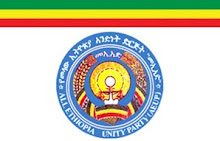The signing of the ethics document regarding the conduct of the up coming election is historic in all aspects of its nature. That is because of the fact that this is the first time ever in history that political patries came close to solving their difference in a peaceful manner in accordence to the expectations and desires of the majority of Ethiopian people, which is to see a peaceful political transition among political parties.
According to all parties involved, the ruling party/ EPRDF, under enormous pressure from the international community, initiated a proposal to sit down and work out the differences it had with opposition parties, and come up with a " win win " agreement all parties involved are satisfied with. The main issues covered in the agreement were human rights, free speech, and free assembly in the run upto the election and beyond.
Five major parties, including the the ruling EPRDF took part in the two months long,closed door, and at times tense negotiations that began with the defection of one of the parties known as MEDREK ( After its proposal to negotiate alone, instead of collectively was rejected by EPRDF), but resulted with the emergence of historic document that seemed to have leveled the playing field to a certain degree.
According to sources, the negotiation was an outcome of increased pressure on both sides of the political spectrum, by the international community via NGOs operating in Ethiopia, who also observed the negotiation process through out and up to the signing ceremony at Sheraton Hotel.
From the opposition side, AEUP, AEDP, and CUD were able to endure two months long of negotiations despite verbal attacks and threats from " good for nothing " political parties and their followers in Ethiopia and abroad. However, the facts of the agreement, including public testimony from Lidetu aka Kihdetu Ayalew, the chairman of AEDP, indicate that AEUP, led by the honorable Eng. Hailu Shawel, single handedly pressured EPRDF to accept the infamous " eight points " proposal it had rejected in 2005, plus six more proposals totaling fourteen demands that are vital to conducting a free and fair election. After the negotiations were concluded, the four opposition parties involved were successful in bringing more than sixty political parties aboard in support of the final document.
Soon after the document was signed, the parties that took part in the negotiations recalled their cadres from their constituencies to designated headquarters or conference rooms in Addis Ababa and other cities, and gave them general knowledge of the document with instructions to hold similar meetings among party members they co-ordinate.
Monday, March 15, 2010
Subscribe to:
Posts (Atom)
